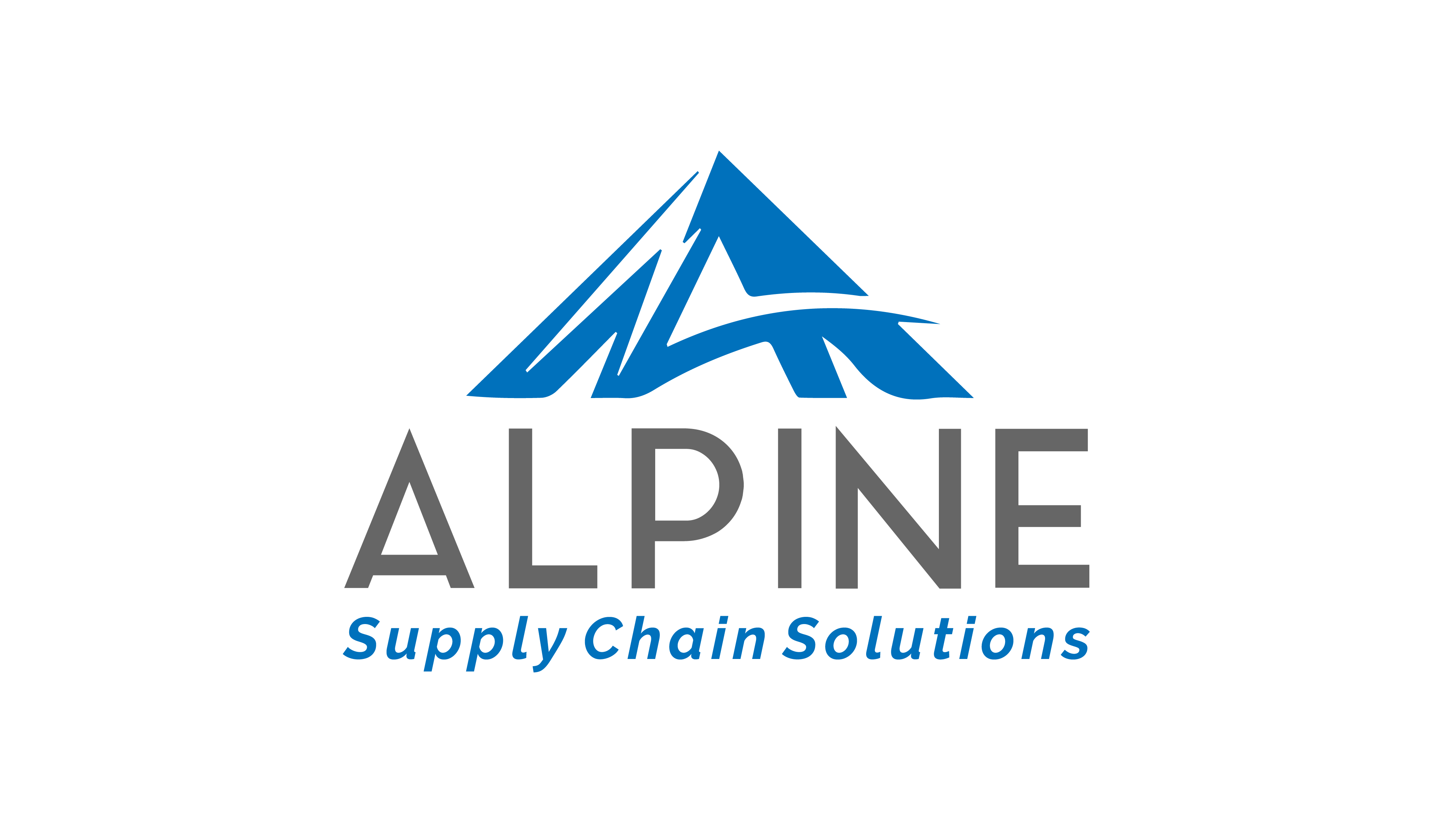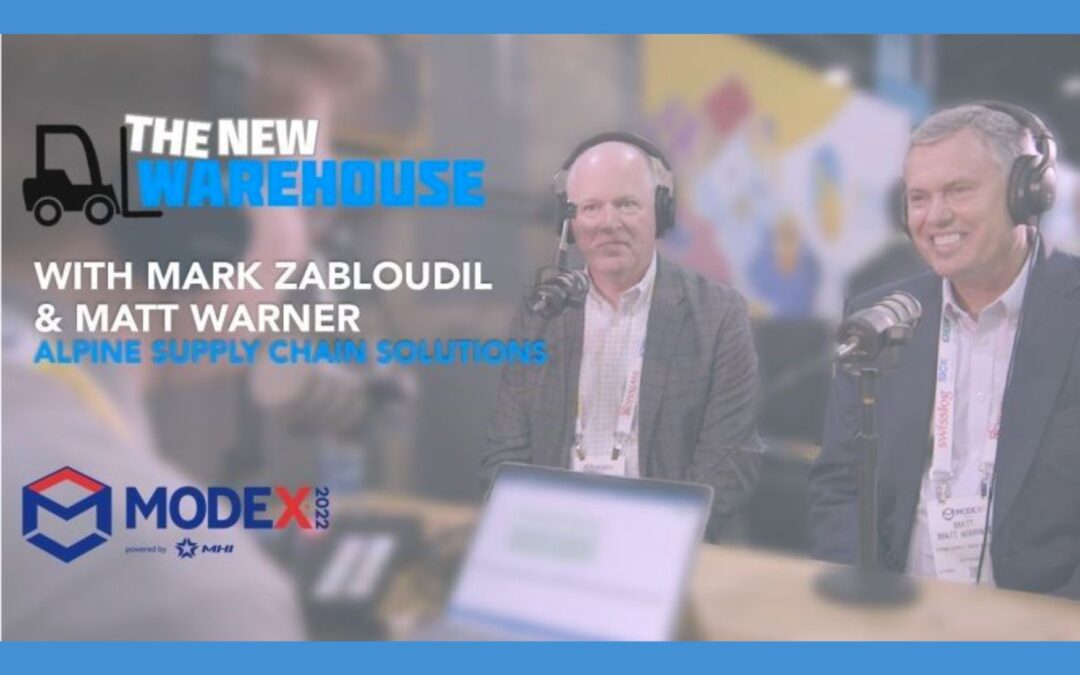
by Noelle Abarelli | Aug 10, 2022 | Alpine News Blog, Supply Chain News
This spring, we attended a record MODEX event. Over 37,047 visitors connected with over 857 exhibitors across 405,000 square feet of exhibit space. We were lucky to have two of our amazing customers, Matt Warner (Monat Global COO) and Mark Zabloudil (MJ Holding COO) join us at the show. During the event, they sat down with Kevin Lawton, CLTD of The New Warehouse Podcast to talk about their engagements with Alpine Supply Chain Solutions. You can listen to the podcast here, or read on for our summary.
Monat Global
Monat Global is a direct-to-consumer distributor of beauty and wellness products servicing customers both internationally and in the US, through eight different countries, and all around the US. As their popularity skyrocketed during the pandemic, they needed help keeping up with demand to keep their customers satisfied. They were looking for the most efficient method to achieve their growth plans while leveraging the skilled labor on-site without the need to increase their employee base.
Monat Global hired Alpine Supply Chain Solutions to help them make sense of their data and develop a strategic master plan. They needed a solution that would support them through their next five years of projected growth.
At the time, they were running two facilities in Florida and Texas and working with a 3PL partner in Utah. All were bursting at the seams. Monat originally had their eye on revamping their Texas operations, but once Alpine analyzed data from peak days of Monat’s 2019 season, it was decided the company would achieve the most rapid benefits by building a new facility near the company’s headquarters in Doral, Florida.
Alpine’s data analysis inspired an efficient design packed with clever storage solutions and automated technology that would enable Monat to distribute more product efficiently. The design included the number of pick locations needed for fulfillment, the amount of storage space needed, and labor required to run the operations. You can learn more about the project here.
MJ Holding
MJ Holding is the largest North American distributor of trading cards, related trading card supplies, collectibles, toys, and hot trend items. With four distribution centers and continued growth, MJ Holding needed help building a new warehouse that would be able to accommodate all on-hand inventory and more.
They contacted Alpine Supply Chain Solutions to help by performing a Storage Type Analysis (STA) to design an ideal layout for their picking operations that could scale. Alpine’s expertise helped determine what kind of racks and sizing would be needed depending on the product profile, as well as what layout would best suit their shipping needs.
With Alpine’s help, MJ Holding was able to consolidate its four distribution centers into one, while increasing floor space and building density. Their storage capabilities became more efficient and were better organized to address the industry’s many peaks and valleys of demand. To hear about their journey, listen to the podcast, or read about in this case study.
The New Warehouse Podcast is your source for insights and ideas from the distribution, transportation, and logistics industry. Be sure to check them out and listen to this episode. For questions on how Alpine Supply Chain Solutions can help you with your supply chain goals, give us a call.
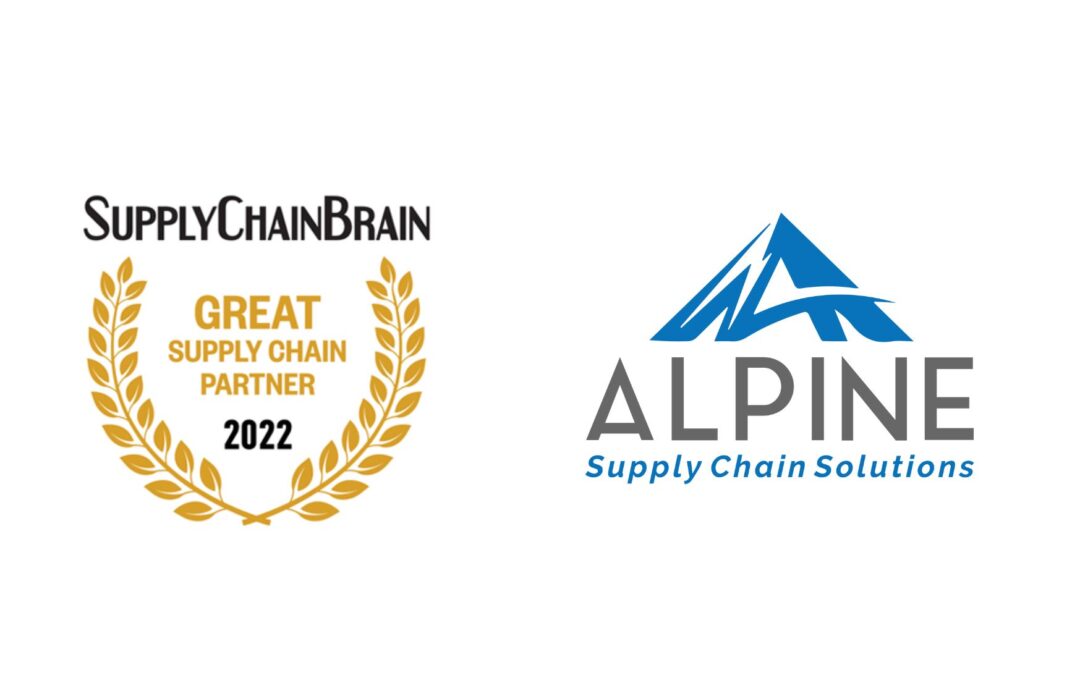
by Noelle Abarelli | Aug 1, 2022 | Alpine News Blog, Supply Chain News
Company receives recognition as a great supply chain partner, as a highly valued supplier for its efficiency, customer service, and supply chain expertise
NAPLES, FL — August 1, 2022 — Alpine Supply Chain Solutions, a supply chain consulting company driven to ensure their clients get the most value from their investments, today announced it has been named to this year’s SupplyChainBrain list of 100 Great Supply Chain Partners.
The list results from a six-month online poll of supply chain professionals conducted by SupplyChainBrain. The call for nominations requires buyers and partners to nominate vendors and service providers whose solutions have made a significant impact on their efficiency, customer service, and overall supply chain performance.
According to Michael Wohlwend, Managing Principal at Alpine, “Our inclusion in this list is representative of the hard work and dedication our team members put into every engagement. Our commitment to high-growth clients like HJI Solutions, MONAT Global, and MJ Holding who are experiencing tremendous success and must expand capacity to onboard new customers and new products quickly is what sets Alpine apart. We’re thrilled to receive this recognition based on nominations from our customers.”
SupplyChainBrain doesn’t hand this distinction out to any supply chain partner out there, a set of 10 criteria must be met. For the past two decades, SupplyChainBrain has reviewed nominations from thousands of vendors pitting them against the highest of standards in:
- Reliability
- Service Excellence
- Value
- Knowledge of the customer’s business
- Problem-solving skills
- An attitude of continuous improvement
- Solid after-sales support
- A positive “can-do” attitude
- Global reach
- Strong leadership.
As Brad Berger, SupplyChainBrain publisher shared, “For twenty years running, SupplyChainBrain has published our much-anticipated list of 100 Great Supply Chain Partners — a select group of companies whose customers recognize them for providing outstanding solutions and services. Our six-month online poll of supply chain professionals requires a qualified response, asking them to nominate vendors and service providers whose solutions have made a significant impact on their company’s efficiency, customer service, and overall supply chain performance. This year’s field of nominees was highly competitive and overall excellent – coming from all sectors of supply chain management.”
To view the complete list of this year’s recipients, please visit the SupplyChainBrain website.
About Alpine Supply Chain Solutions
Alpine Supply Chain Solutions, based in Naples, FL, is a supply chain consulting company driven to ensure their clients get the most value from their investments. Their approach to every project starts with the data and ends with a cost justifiable solution. With deep roots in industrial engineering, Alpine’s approach is unique. For more information, please visit: http://www.AlpineSupplyChain.com.
About SupplyChainBrain
SupplyChainBrain is a comprehensive supply chain management information resource and accessed year-round through a wide range of ever-evolving multi-media formats by hundreds of thousands of the world’s most influential supply chain executives. In addition to addressing the fundamental principles of supply-chain management, SupplyChainBrain identifies the latest news, emerging trends, technologies and best practices, forward-thinking ideas, and cutting-edge solutions – and continues to write and report about these as they evolve and mature. Learn more at: https://www.supplychainbrain.com/.
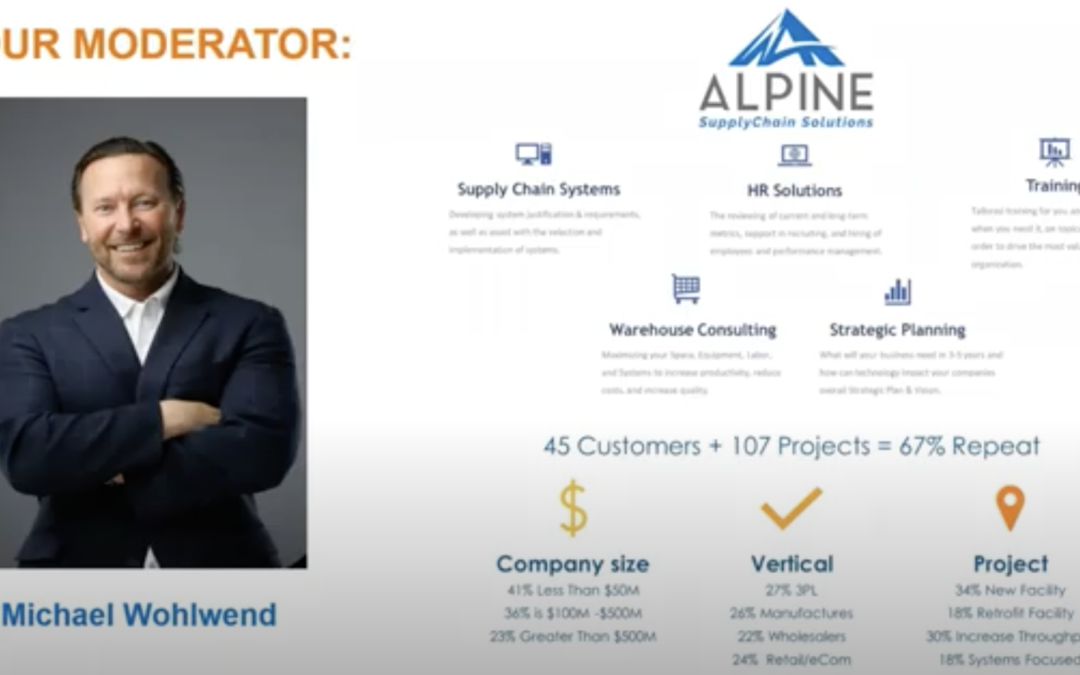
by Alpine Supply Chain | Mar 15, 2021 | Alpine News Blog, HR Solutions, Supply Chain News, Webinar
Supply Chain Industry Leaders discuss inclusion and diversity in this WERC Webinar.
- Randy Lewis – Walgreens SVP Supply Chain
- Tom Gustafson, Bed, Bath & Beyond VP Human Resources
- Brad Nardick, CEO, The Bazaar
- James Emmett, CEO James Emmett & Co
- Michael Wohlwend CEO Alpine Supply Chain
Diversity is the presence of differences within a given setting. In the workplace, that can mean differences in race, ethnicity, gender, gender identity, sexual orientation, age, and socioeconomic class. Equity is the act of ensuring that processes and programs are impartial, fair and provide equal possible outcomes for every individual.
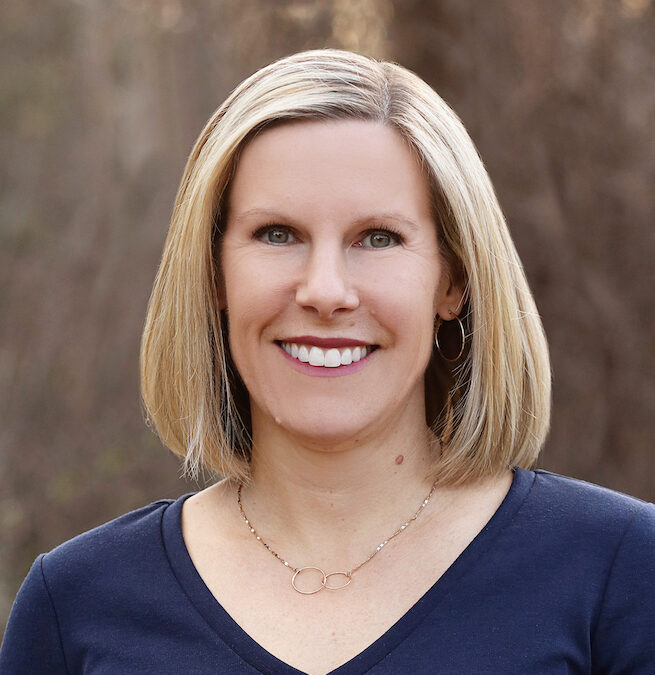
by Alpine Supply Chain | Jan 26, 2021 | Alpine News Blog, Supply Chain News
Five questions with Sarah Smith, the newest member of Team Alpine
Q: Why did you decide to join the Team Alpine?
A: I’ve spent the past 20 years working for a supply chain software provider. I am really excited to take all the knowledge I’ve gained and share that with Alpine clients. In this role, I will get the chance to be a trusted advisor without ties to any particular vendor.
Q: What were you doing before you joined Alpine?
A: I was a Director of Professional Services with Manhattan Associates where I designed and implemented warehouse management systems for clients.
Q: What professional accomplishments are you most proud of?
A: I have diverse experience across a wide range of verticals and industries. I’m proud of having helped these clients tackle their biggest challenges – like meeting their delivery windows and cost objectives and enabling them to achieve strong ROIs on their software investments. At Manhattan Associates, I was one of few from the services side of the business to be selected for President’s Club. It was a real honor to be recognized for the quality of work I deliver.
Q: What makes you unique?
I listen deeply to my clients so I can gain a true understanding of their challenges, that’s what makes me a trusted advisor. I love figuring out the root causes of their issues and coming up with creative solutions to address them. I don’t believe in band aids – I like solving core issues and removing bottlenecks long term.
Q: Tell us a bit about who you are outside of work.
A: I’m married and have a son age eight and a daughter who is six. We love to travel and this summer visited eight National Parks! It was great. We’re currently planning another road trip around Florida. I also love to run.
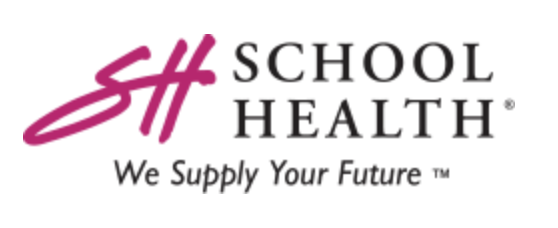
by Alpine Supply Chain | Dec 20, 2020 | Strategic Planning, Supply Chain News, Warehouse Consulting, Warehouse Slotting
School Health Corp., an Alpine Supply Chain Solutions client, was recently featured in Modern Materials Handling article discussing their new warehouse project using innovative labeling and strategic warehouse slotting optimization.
“While we are adept at warehouse operations and order fulfillment, our current team had never designed a warehouse from scratch before,” says Beth Reed, School Health’s project manager/training developer.
“With this in mind, how could the company slot its product inventory for maximum efficiency and throughput? What is the best way to handle seasonal spikes in demand for certain products, which typically occur at the start of each new school year? And, how should it number and label its bins—for optimal performance with its existing warehouse management software?”

Beth Reed, Project Manager & Training Developer at School Health
To receive assistance with its warehouse location methodology and slotting plans, School Health Corp worked with Alpine SupplyChain Solutions. The project’s goals included minimizing the time and distance required to replenish key products; reducing workers’ bend-and-reach requirements for placing and picking products; and organizing its inventory more efficiently, leading to greater throughput.
“In my role, I hadn’t previously spent a lot of time thinking about warehouse location address methodology,” Reed notes. “But working with Alpine made the entire project team appreciate the science involved in slotting our products.” She continues, “An optimally slotted warehouse supports efficiency and profitability. Just as important, it also minimizes the time and effort involved in key tasks like product putaway, picking and order fulfillment, which our employees appreciate.”

by Alpine Supply Chain | Jul 13, 2020 | Supply Chain Consulting, Supply Chain News, Warehouse Management System
Supply Chain Management Review and Modern Material Handling sat down with Michael Wohlwend to discuss WMS.
Modern: You’ve been around the supply chain software space throughout your career. Tell us about the different roles you’ve held.
Wohlwend: I was a warehouse distribution supply chain consultant for the first third of my career, and I installed my first warehouse management system (WMS) in 1994. That was followed by 7.5 years at Manhattan and 6.5 years at SAP. Now, I’m back to the consulting side.
Modern: Since you’ve worked in both the enterprise resource planning (ERP) and WMS spaces, what have been the most important developments during your career? We’ll start with ERP.
Wohlwend: Originally, an ERP system was finance and accounting. And then, they added manufacturing resource planning and planning. After that, ERP tried to be all things to all people and address the end-to-end supply chain. That had its limitations and opened the door for best-of-breed solution providers, especially with the Cloud.
Great examples of that are Salesforce.com for CRM and Workday for HR. Now, we see ERP companies buying Cloud-based software companies with a subscription model to offer best-of-breed solutions under the ERP umbrella. The technology is evolving.
Modern: How about the WMS space?
Wohlwend: For a time, CIOs trying to reduce their overall software footprint were getting the WMS module from an ERP provider like Oracle or SAP. In situations that weren’t complex, like pallet in and pallet out, the WMS from an ERP was good enough. Now, there’s a resurgence of WMS. The real trend I’m seeing is global manufacturers moving to a 3PL for their distribution and deferring to the 3PL’s WMS. And, most of the 3PLs will have a low-cost WMS, with less functionality, and a higher cost version. Depending on complexity, the 3PL will choose which version to roll out for their customer.
Modern: What are your clients struggling with today, particularly with WMS systems?
Wohlwend: Whenever you’re implementing a WMS, you run out of resources, time or money. So when people install a WMS, they never turn everything on because they run out of one of those three. Then, they run into an issue and don’t realize they have the functionality.
I recently went to a site that wasn’t doing directed putaway or batch picking because they’d never turned on the functionality. It cost them $52,000 and they had an ROI in two weeks. The No. 2 reason is that they business model changed. For example, with Covid-19 now they may need to turn on each picking and need to configure along with cartonization. Their WMS has the functionality but needs to be configured.
Modern: Given all the changes in fulfillment processes, what should a company do?
Wohlwend: The most common thing I see is that they didn’t turn on all the functionality, and they haven’t upgraded, so now they’re at a pivot point. Do I keep an existing system and “add on modules” like voice, labor management, or slotting modules? Or, do I rip and replace? There are companies adding “Add on Modules” on top of old versions of EXE and Catalyst.
The problem with ripping and replacing is that a lot of the new systems are in the Cloud. That sounds good, but I just worked with a 3PL that couldn’t get Internet access at their site. They had to have a server on site. And when you’re talking about an automated system that requires sub-second response times, I believe it has to be on-premise. You just can’t risk your order fulfillment system on a connection that could go down.


